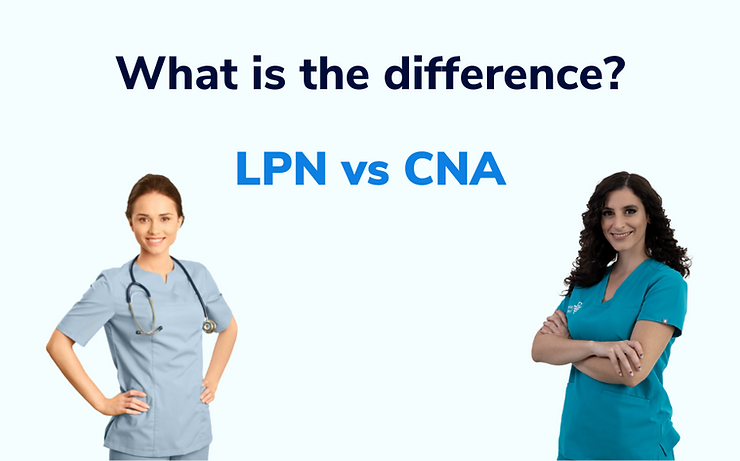
Licensed Practical Nurses (LPNs) and Certified Nursing Assistants (CNAs) both occupy similar roles in the healthcare industry. Both are entry-level positions that play a key role in ensuring smooth operations and high-quality care. When you look further into the specifics, you will see that they differ in several key areas. What is the difference between LPNs and CNAs? What is the best option for an aspiring HCP looking to enter the industry? Read on to learn all this and more.
Roles and Responsibilities of LPN and CNA:
CNAs are primarily responsible for basic care duties, under the supervision of a Registered Nurse (RN), LPN, or other HCP. Patients are often in no condition to take care of these tasks on their own, which is why CNA work is so important. This includes:
By comparison, LPNs take on more advanced responsibilities. Like CNAs, they also need direct supervision from an RN before they carry out their duties such as:
In summary, LPNs provide more direct clinical patient care, while CNAs assist other HCPs (Including LPNs) and carry out a more limited scope of care services. Both are crucial for any healthcare facility to function.
Educational Requirements of LPN and CNA:
Compared to other HCP roles, both LPN and CNA have accessible educational requirements. Education and training for RN roles and beyond are a serious investment, both timewise and financially. By comparison, aspiring CNAs only need a General Educational Development (GED) or high school diploma to enroll in a state-approved training program that lasts around 4 to 12 weeks. Students can expect some supervised clinical work and coursework that covers anatomy, psychology, patient rights, and basic care practices. These classes can be found in most community colleges, vocational schools, Red Cross branches, and even some medical facilities. You can find some online classes, but even those will have a hands-on component.
The differences between LPNs and CNAs lie in the extent of their training. LPN training programs are more detailed and complex. These accredited certificate/diploma programs will take over 1 to 2 years to complete. Coursework will include more complex subjects such as pathophysiology, ethical issues in nursing, medication dosage, administration, and specialized care. Just like with CNA programs, however, you can find them in a lot of community colleges and vocational schools. These classes also emphasize hands-on clinical training, even if you enroll in an online course.
Certification
After you graduate from your respective training program, it is time to apply for certification. This ensures that you meet the state’s criteria for knowledge, training, and competence as an LPN or CNA. LPNs nationwide need to take the National Council Licensure Examination for Practical Nurses (NCLEX-PN). Meanwhile, CNAs have to complete a state-specific competency exam. Pre-test requirements will vary from state to state, but they will generally ask for your high school diploma, proof of completion of an accredited CNA training program, a minimum number of CNA training hours, and sometimes even a criminal background check. As soon as you take and pass these tests, you will gain the certification needed to practice in your chosen role.
LPN Salary vs CNA Salary
For many nurses, income is the biggest deciding factor in which entry-level nursing career they ultimately choose. According to the Bureau of Labor and Statistics (BLS), CNAs earn around $30,290 a year while LPNs earn $48,070 annually. Salaries will also depend on the experience, location, and facility you are working in, but LPNs will generally outearn CNAs in most contexts. Between their greater responsibilities and the increased difficulty of their tasks, it is no wonder why this is the case. Regardless, both will be expected to be in high demand for the years to come thanks to aging patient populations and increasing nurse turnover.
The best option
The differences between LPNs and CNAs are considerable, but they share much in common. Both HCPs are valued in the workplace and will allow you to build experience and capital for further education and training, down the line. Which one works best for you will depend on your circumstances. If you have limited resources or you want to start healthcare work as soon as possible, then CNA is the way to go. If you can invest in a longer training period and you prefer greater responsibilities and more intimacy, then LPN is the job for you. Regardless of what you pick, CNA and LPN are perfectly respectable entry-level career paths for aspiring nurses.
Copyright © 2024 Vitawerks